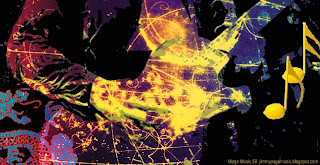~ Robert Plant, interview by Tim Cummings, July 11 2012
Mage Music 58
We all know about play. We might not play very much as adults compared to kids, but play is an integral part of a healthy childhood and kids play a lot. It’s probably no coincidence that generating music with musical instruments is called “playing”, because the two are related.
It probably won’t come as any surprise to you that play and Magick can be related, as well.
Children naturally and spontaneously engage in music and play, and often the two are inseparable activities. Kids often will sing or hum while totally focused on their play activities, and we all know about play activities that involve chanting or singing. How can you hop through the hopscotch pattern, jump rope or play clapping games with your best friend without music?
If you think back, you might remember how it felt to become completely submerged in the world you played in – and how that play world was not necessarily at all like the world around you in reality. Do you remember how you completely were in that world, and how you experienced it the same way as the here and now, the “real” reality?
The Swiss psychologist and philosopher, Jean Piaget (1896-1980), described how children take information from their experiences in the outside ("real") world and integrate that information into the mental structures they've created for themselves. They then learn to change or accommodate their mental structures to better match up with what they already know. That's how they learn to operate in a world of grownups.
But when playing, children do the opposite: They suspend the grownup reality and make their internal world adapt to experiences of their own choosing. And then they fully live there for the duration of the play time.
An isn't it interesting that musicians do that, too - and so do Mages.
Dreams, play, music and Magick
 Dreams are like play in that the dreamer is totally immersed in a reality of his own creation. Musicians, too, can become fully immersed in a created reality of the musical moment. How many photos have you seen of Jimmy Page totally absorbed in the sound and creative process, surrounded by band and stage crew, in front of tens of thousands of people - and yet oblivious to the world around him? Eyes closed, face sometimes vacant, sometimes distorted with intense focus, the “real” reality has ceased to exist for him in that moment.
Dreams are like play in that the dreamer is totally immersed in a reality of his own creation. Musicians, too, can become fully immersed in a created reality of the musical moment. How many photos have you seen of Jimmy Page totally absorbed in the sound and creative process, surrounded by band and stage crew, in front of tens of thousands of people - and yet oblivious to the world around him? Eyes closed, face sometimes vacant, sometimes distorted with intense focus, the “real” reality has ceased to exist for him in that moment.
Just like a kid.
This is the very state a Mage needs to generate in himself to manifest change in the world. The state can be reached through any well-executed ritual, but music is natural and familiar to the brain and the body, and thus using music as ritual of Magick allows transmutation of reality to become a more natural and familiar process, too.
I'm cutting this week's Mage Music post short because I want to have some playtime of my own. See you next week, and enjoy your Summer's Day.
This is the very state a Mage needs to generate in himself to manifest change in the world. The state can be reached through any well-executed ritual, but music is natural and familiar to the brain and the body, and thus using music as ritual of Magick allows transmutation of reality to become a more natural and familiar process, too.
♫
I'm cutting this week's Mage Music post short because I want to have some playtime of my own. See you next week, and enjoy your Summer's Day.
♫







